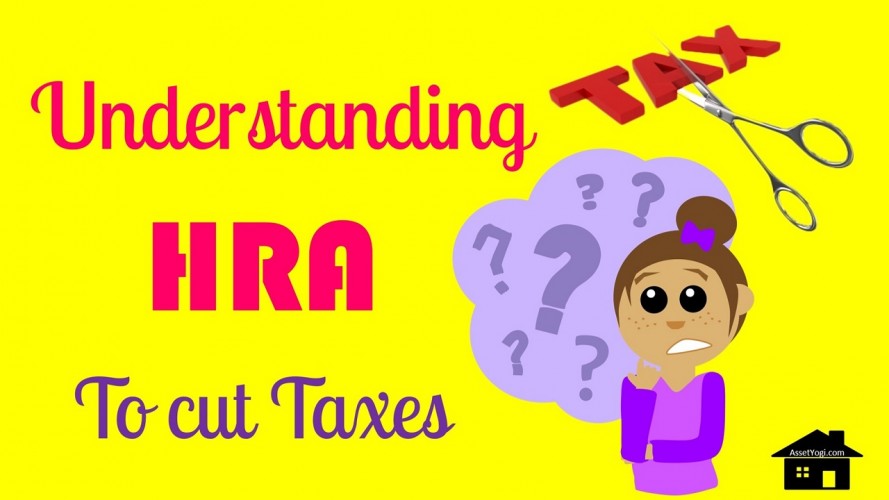What is House Rent Allowance?
House Rent Allowance (HRA) is the salary allowance given by an organization to the employee to meet the expenses related to renting a house for residential purposes. House Rent Allowance is taxable under head “Income from Salaries” after deducting HRA exemption under section 10 (13A) of Income Tax Act. Therefore, it is important to know HRA calculation & exemption rules to save on your income tax.
HRA Exemption u/s 10 (13A) of IT Act
HRA exemption depends on the following factors:
- Basic Salary – Includes Basic Pay + Dearness Allowance + Any Commissions earned. Excludes all other allowances and perquisites.
- HRA – House Rent Allowance received by you from your employer.
- House Rent – Actual rent paid by you to the property owner.
- Place of Residence – Whether the city where you reside is a Metro or Non-Metro. If you reside in a Metro City (Delhi, Mumbai, Chennai, Kolkata), tax exemption limit is 50% of Basic Salary and for non-metro cities, tax exemption limit is 40% of Basic Salary.
HRA exemption under section 10(13A) for any financial year is minimum of the following:
- Actual HRA received, or
- Actual Rent Paid minus 10% of Basic Salary, or
- 50% of Basic Salary (in case you reside in a Metro City) or 40% of Basic Salary (in case you reside in a Non-Metro City).
Important Points on HRA Calculation and Exemption
- Rent paid to Parents can be claimed – If you are staying in a house that is owned by your parents, you can pay rent to your parents and claim the HRA exemption. However, your mother or father (who receives rent) will have to declare that rental income under their total income while filing their tax returns.
- Rent paid to Spouse cannot be claimed – Husband and wife are supposed to stay together and their relationship is not that of commercial nature. So, rent paid to spouse is not allowed for HRA exemption.
- Home Loan and HRA combined benefits – Since, Home Loan and HRA components are covered under separate sections of IT Act, they do not have bearing on each other. You can claim benefits under both. For eg. if you have taken a home loan for a property that is in another city and you are staying in a rented accommodation in another city, you can claim home loan tax benefit for principal payment (under section 80C) & interest payment (under section 24) as well as HRA exemption (under section 10 (13A)).
- No exemption if the house rent paid does not exceed 10% of Basic Salary.
- If the house rent paid exceeds Rs. 1.8 lakh per year (or Rs. 15,000 per month), PAN Card number of the house owner is to be declared.
- If you pay house rent for only part of the year, you can claim HRA exemption only for that period.
- The HRA exemption can be claimed only on the actual rent paid. In case, you are staying in a house owned by you or if you are staying in a house owned by your parents where you are not paying any rent, no HRA exemption is allowed. Employers generally ask for rent receipts as proof for HRA calculation and exemption.
- In case, both husband and wife are working and staying in a rented accommodation, both can claim HRA exemption in the proportion of the rent paid by them.
- Self-Employed professionals are not allowed HRA exemption as they are not salaried individuals. However, they can claim deduction on house rent expenses from their income under section 80GG, which extends similar benefits like that of section 10 (13A).

HRA Calculation – An Illustration
In order to understand HRA calculation, let us take an example of Mridul Ranjan, a Bank Manager staying with his parents in Gurgaon. He pays a monthly rent of Rs. 20,000 to his father, a senior citizen and owner of the house.
Salary & Rent breakdown of Mridul for last financial year is as follows:
| Head | Monthy (in Rs.) | Annual (in Rs.) |
| Basic Pay | 20,000 | 240,000 |
| Dearness Allowance | 8,000 | 96,000 |
| Basic Salary (Basic+DA) | 28,000 | 336,000 |
| HRA | 18,000 | 216,000 |
| Actual Rent | 20,000 | 240,000 |
HRA Exemption for Mridul
Minimum of following will be exempted for HRA.
- Actual HRA Received = Rs. 2,16,000
- Actual Rent Paid minus 10% of Basic Salary (240,000 – 33,600) = Rs. 2,06,400
- 40% of Basic Salary = Rs. 1,34,400 (minimum)
Therefore, Mridul can claim HRA exemption for Rs. 1,34,400 and balance HRA (Rs. 81,600) will be taxable.
Now, that you know HRA calculation and exemption rules, we hope that you can maximize your tax savings.
Over to You
We need your love! Like and Share this Guide on “House Rent Allowance (HRA) Calculation & Exemption Rules”, if you found it useful.
Have something to say or ask? Please comment below.

